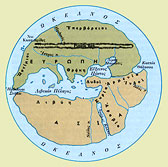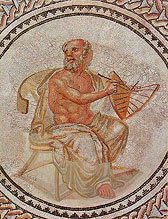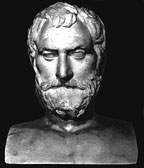|
The Archaic Period
Culture
In the Archaic period Miletus was the theatre of the most important scientific inventions:  it was the birthplace of the earliest and most prominent Ionian natural philosophers. it was the birthplace of the earliest and most prominent Ionian natural philosophers.
Contact with the great Oriental civilisations (Babylon, Egypt), the flourishing of shipping, the foundation of colonies in areas which until the late 8th century BC were foreign to Greeks, all these were decisive factors in the formation of a new vision ("theoria") of nature and the world.
In the early 6th century BC, the Miletian Thales, Anaximander and Anaximenes, seeking the primal elements of the world, set the foundations for the development of a scientific, deterministic explanation, free from mythical genealogies. Their interpretations were based on experience and observation.  That is the reason why they are more correctly described as "natural philosophers". The term "Presocratic" is also widespread. That is the reason why they are more correctly described as "natural philosophers". The term "Presocratic" is also widespread.
Thales (ca. 624-547 BC) turned his attention to mathematics, astronomy and geography. He foresaw the sun eclipse of 585 BC, offering a "physical" explanation of the phenomenon. Regarding an interpretation of the world, he argued that water is the beginning of the world, the basic element. Historical sources suggest that he was also involved in politics: he tried to unite Ionian cities into a coalition in order to resist the Persian occupation. He may have failed, but if this piece of information is true his thought was corroborated by hindsight.
Anaximander (ca. 610-546 BC) also occupied himself with geometry and geography.  From what we know, he was the first to expose his views in a book. He was also the first to use the term "Arche", which means both beginning and basic element, basic substance. For Anaximander, the beginning of being, that is of the world, is the apeiron (infinity). The vision of the world was organised according to a geometric model, in which concepts of moral and political thought, such as the concepts of law and order, were employed. From what we know, he was the first to expose his views in a book. He was also the first to use the term "Arche", which means both beginning and basic element, basic substance. For Anaximander, the beginning of being, that is of the world, is the apeiron (infinity). The vision of the world was organised according to a geometric model, in which concepts of moral and political thought, such as the concepts of law and order, were employed.
Anaximenes (ca. 585-525 BC) considered the air as the basic element of the world and life. The air surrounds everything and everything is born out of its contraction and expansion.The great part played by the Miletians' naval experience in the formation of their beliefs can also be seen in the fact that they studied the subjects of geography and astronomy. It is no coincidence that one of the first cartographers, Hecataeus, came from Miletus.
|